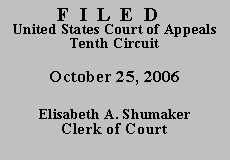

| UNITED STATES OF AMERICA, |
|
| v. | |
| JESUS FALLS, |
|
I. BACKGROUND
In December of 2002, a jury in the United States District Court for the District of New Mexico found Mr. Falls guilty of distribution of 50 grams or more of a cocaine substance containing a cocaine base in violation of 21 U.S.C. §§ 841(a)(1) and 846(b)(1)(A) and conspiracy to commit that offense in violation of 21 U.S.C. §§ 841(a)(1) and 846. Mr. Fall's arrest and conviction were the result of a 2001 "buy/bust" set up by the Albuquerque Police Department in which Mr. Falls and his co-conspirator, Mr. Rodriguez, sold approximately five ounces of cocaine-based substance to an under-cover officer.
On March 7, 2005, Mr. Falls filed the instant pro se 28 U.S.C. § 2255 petition to vacate, set aside, or correct his sentence. He argued that he had received ineffective assistance of counsel in violation of the Sixth Amendment because his counsel failed to 1) introduce a tape recording of the drug deal at issue; 2) introduce his cell phone records; and 3) present expert witness testimony regarding the absence of fingerprints on the plastic bags that contained the drugs. Mr. Falls also sought relief on the grounds that his sentence was unconstitutional under Apprendi v. New Jersey, Blakely v. Washington, and Booker v. United States. 530 U.S. at 466; 542 U.S. at 296; 543 U.S. at 220.
The district court dismissed Mr. Falls' sentencing claims because 1) Mr. Falls did not raise his Apprendi claims on appeal; and 2) because Blakely did not apply retroactively to convictions that were final on June 24, 2004. U.S. v. Price, 400 F.3d 844, 849 (10th Cir. 2005). Mr. Falls conviction became final on June 5, 2004. The district court directed the government to respond to Mr. Falls' ineffective assistance of counsel claims. After reviewing Mr. Falls' brief and the government response, the magistrate judge recommended that Mr. Falls' § 2255 motion be denied. The district court then reviewed the magistrate judge's report and recommendation and Mr. Falls' objections, adopted the magistrate judge's report and recommendation, and dismissed Mr. Falls' claims with prejudice.
In order to obtain a COA, Mr. Falls must make "a substantial showing of the denial of a constitutional right." 28 U.S.C. § 2253(c)(2). Mr. Falls may make this showing by demonstrating that "jurists of reason could disagree with the district court's resolution of the case or that the issues presented were adequate to deserve encouragement to proceed further." Miller-El v. Cockrell, 537 U.S. 322, 336 (2003). "[A] claim can be debatable even though every jurist of reason might agree, after the COA has been granted and the case has received full consideration, that [the] petitioner will not prevail." Id. at 338.
Here, for substantially the same reasons set forth in the magistrate judge's report and recommendation, adopted by the district court, we conclude that Mr. Falls is not entitled to a COA. Mr. Falls' ineffective assistance claims satisfy neither the performance nor the prejudice prong of the test set forth in Strickland v. Washington. 466 U.S. 668, 686-87 (1984). Primarily, as the district court found, Mr. Falls failed to support his allegations that the audio tape of the drug deal was audible or that it contained any exculpatory evidence. Secondly, Mr. Falls cannot demonstrate that his cell phone records would have been of any probative value at his trial. Thirdly, there is no indication that a fingerprint expert would have been of any value to Mr. Falls case since the government stipulated to the fact the his fingerprints were not on the bags of crack. In sum, there is no colorable argument that Mr. Falls' attorney was ineffective for failing to introduce the tape recording, Mr. Falls' cell-phone records or call a fingerprint expert.
Turning to Mr. Falls' sentencing claims, as the district court noted, Mr. Falls' Apprendi claim was procedurally barred because he failed to raise the issue on appeal. United States v. Cox, 83 F.3d 336, 341 (10th Cir. 1996) ("A § 2255 motion is not available to test the legality of a matter which should have been raised on direct appeal."). Furthermore, no relief is available under Booker or Blakely because the decisions do not apply retroactively. Price, 400 F.3d at 844; Booker, 543 U.S. at 268 (holding that Booker applies only to pending or on direct review at the time of the decision).
In addition, we note that Mr. Falls briefly alludes to a Confrontation Clause claim in his brief. We do not consider this claim for two reasons. Primarily, since Mr. Falls did not raise the issue below, it is not properly before us. See Cummings v. Norton, 393 F.3d 1186, 1190 (10th Cir. 2005) (noting the general rule that issues not raised in the district court are waived). Secondly, to the extent that Mr. Falls discusses the alleged violation of his rights under the Confrontation Clause, he does not adequately state his grounds for relief; rather his argument consists of a single conclusory statement.
Accordingly, we DENY Mr. Falls' application for a COA, we DENY his motion to proceed in forma pauperis, and we DISMISS the matter.
Entered for the Court,
Robert H. Henry
Circuit Judge